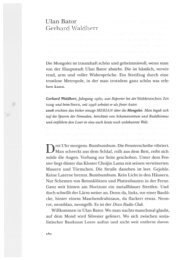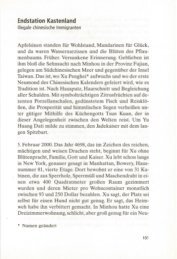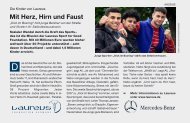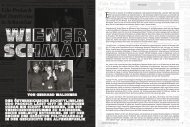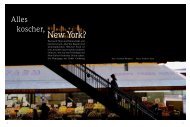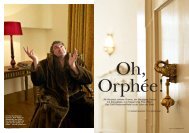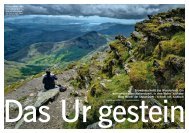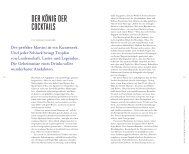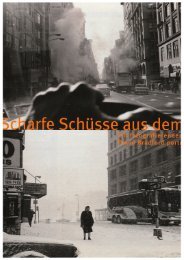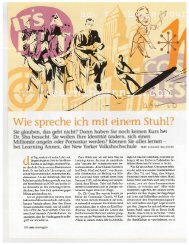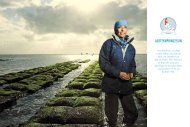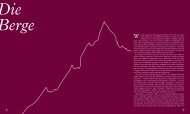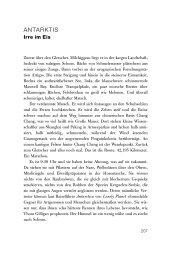You also want an ePaper? Increase the reach of your titles
YUMPU automatically turns print PDFs into web optimized ePapers that Google loves.
<strong>Gerhard</strong> <strong>Waldherr</strong><br />
HEaRtLAND<br />
“We’re too great a nation<br />
to limit ourselves to small dreams”<br />
Ronald Reagan<br />
“Ah, get born, keep warm<br />
Short pants, romance, learn to dance<br />
Get dressed, get blessed<br />
Try to be a success<br />
Please her, please him, buy gifts<br />
Don’t steal, don’t lift<br />
Twenty years of schoolin’<br />
And they put you on the day shift<br />
Look out kid<br />
They keep it all hid…”<br />
Bob Dylan,<br />
Subterranean Homesick Blues<br />
19<br />
Outside the Aladdin Casino<br />
Las Vegas<br />
Nevada, 2003<br />
20<br />
Paris<br />
Las Vegas<br />
Nevada, 2003<br />
21<br />
On the Road<br />
Truth or Consequences<br />
New Mexico, 2003
I<br />
1898 errechneten Landvermesser des U.S. Coast and Geodatic<br />
Survey den geografischen Mittelpunkt der Vereinigten Staaten. Sie<br />
beschränkten sich dabei auf den amerikanischen Kontinent ohne<br />
Alaska. Das Ergebnis: 39° 48’ 38’’ Nord, 98° 33’ 22’’ West, ein Punkt<br />
in der Weite der Great Plains, nahe der Ortschaft Lebanon, Kansas.<br />
Ich wollte immer nach Lebanon. Vielleicht, weil es nach<br />
Verheissung klingt. Nach Libanon, Zedern, grünen Hügeln auf dem<br />
Weg ins Gelobte Land. Eine Cousine meiner Mutter hatte nach<br />
dem Zweiten Weltkrieg einen GI geheiratet und war nach Kansas<br />
gezogen. Jedes Weihnachten schickte sie Bilder von sich mit<br />
Mann und Sohn. So wurde Kansas Symbol für dieses Land, in dem,<br />
wie es hiess, alles besser und grösser sein sollte. Später, als ich<br />
schon in New York lebte, begegnete mir Lebanon, Kansas, dann<br />
regelmässig. Immer wenn Amerika seine Befindlichkeiten ergründet,<br />
schickt es Reporter zu seinem Mittelpunkt. Als erzähle der Platz<br />
eine allumfassende Wahrheit über Land und Leute, ein Orakel<br />
zwischen Weizenfeldern.<br />
Ich erinnere einen Artikel in National Geographic, der von<br />
Menschen handelte, die eine halbe Stunde mit dem Auto fahren, um<br />
Gemüse zu kaufen, von Schulen, die schliessen, und Städten, die<br />
sterben. Die New York Times erzählte von einem Farmer, der von<br />
Sonnenaufgang bis nach Sonnenuntergang arbeite, sieben Tagen die<br />
Woche, unterbrochen nur vom Gottesdienst am Sonntagmorgen.<br />
Und all das hatte ich im Kopf, als ich endlich da angekommen war.<br />
Oktober 2009. Der Himmel hing über den Feldern wie ein schmutziges<br />
Laken. Der Wind sang in kaputten Dächern, rüttelte an den<br />
Brettern, die in ihre Fenster genagelt waren. Lebanons Main Street<br />
erinnert an das Gebiss eines alten Mannes. Ruinen zwischen Lücken.<br />
Die Gehsteige leer, niemand zu sehen, bis ein Pick-up stoppte<br />
und ein Mann rief: «Howdy, what brought you out here?»<br />
Von St. Louis durch Missouri und weiter nach Kansas, dann<br />
über die Interstate 70 nach Westen, über die R 181 nach Norden<br />
bis Lebanon und schliesslich durch Nebraska und Süddakota Richtung<br />
Mount Rushmore. Das war der Plan. Eine Reise durch die<br />
I<br />
In 1898, employees of the U.S. Coast and Geodetic Survey calculated<br />
the geographical center of the United States, restricting<br />
themselves to the American continent without Alaska. The result:<br />
39° 48’ 38’’ North, 98° 33’ 22’’ West, a spot located in the wide<br />
open Great Plains, near the town of Lebanon, Kansas.<br />
I always wanted to go to Lebanon. Maybe because the<br />
name is so allusive. To Lebanon, cedar trees and green hills on the<br />
way to the promised land. My mother had a cousin who married<br />
a GI after the Second World War and moved to Kansas. Every<br />
Christmas she sent pictures of herself with her husband and her<br />
son. So Kansas became a symbol for this country where everything<br />
was supposed to be bigger and better. Later, when I was living<br />
in New York, I kept running into Lebanon, Kansas. Whenever the<br />
United States want to find out how they feel, they send reporters<br />
to the center. As if that spot contains the definitive truth about<br />
the country and its people, an oracle amongst the fields of grain.<br />
I remember an article in the National Geographic, about<br />
people who have to drive half an hour by car to buy vegetables,<br />
about schools closing down and about cities dying. The New York<br />
Times ran a story about a farmer who works from sunup to sundown<br />
seven days a week, stopping only for church on Sundays. And<br />
all of that was on my mind when I finally got there. October 2009.<br />
The sky hovered above the fields like dirty sheets. The wind whistled<br />
through caved-in roofs and rattled the boards nailed onto<br />
the windows. Lebanon’s Main Street looked like an old man’s teeth.<br />
Rotting ruins with gaps in between. Empty sidewalks, not a soul<br />
in sight until a pickup truck stopped and a man shouted, “Howdy,<br />
what brought you out here?”<br />
From St. Louis through Missouri and on to Kansas, then west<br />
on Interstate 70, north to Lebanon on the R 181 and finally through<br />
Nebraska and South Dakota in the direction of Mount Rushmore.<br />
That was the plan. A trip to the Great Plains, to the lonely center<br />
of the United States, through the endless monotony of the grasslands.<br />
My first trip to the Plains took me south through Oklahoma
Great Plains, durch das einsame Zentrum Amerikas, durch die endlose<br />
Monotonie des Grassland. Meine erste Reise in die Plains<br />
führte nach Oklahoma im Süden zu Klapperschlangenjägern. Meine<br />
zweite führte in die Dakotas im kalten Norden, wo die Welt meist<br />
nur aus oben und unten besteht, Himmel und Erde und nichts<br />
dazwischen. Doch nie vergessen werde ich diese Fahrt von Kansas<br />
City nach Arizona. Es war kurz nach dem 11. September 2001 und<br />
nach dem Ende einer Liebe. Ein strahlender Herbsttag rutschte in<br />
die Dämmerung. Alle zwanzig Meilen ein Getreidesilo. Ich hörte<br />
Musik von Bob Dylan und dachte an Truman Capotes Kaltblütig, das<br />
in Holcomb, Kansas, spielt, einer Gegend, «die selbst für die anderen<br />
Kansaner hinter dem Mond liegt».<br />
<strong>Heartland</strong>. So nennt man die Plains. Herzland. Und das hat<br />
nicht nur mit ihrer geografischen Lage zu tun. Im <strong>Heartland</strong> wurde<br />
der Westen gewonnen in blutigen Gemetzeln mit den nordamerikanischen<br />
Ureinwohnern. Hier zogen Mitte des 18. Jahrhunderts<br />
fast eine halbe Million Siedler über den Oregon Trail. Hier begann<br />
1862 mit dem Homestead Act das grösste staatliche Besiedlungsprogramm<br />
der Geschichte. Sie gaben jedem Antragsteller 160<br />
Acres, um die Lücke zu schliessen, die klaffte zwischen Atlantik- und<br />
Pazifikküste. From sea to shining sea. Deutsche, Russen, Schweden,<br />
Tschechen, Litauer, Iren kamen. Abenteurer, Hungerleider, Träumer.<br />
Sie bauten Farmen, Schlachthäuser und Fabriken, fleissige, bescheidene,<br />
gottesfürchtige Menschen, getrieben vom Mythos des<br />
amerikanischen Traums.<br />
Und so ist es bis heute. Im <strong>Heartland</strong> grüsst man mit «Madam»<br />
und «Sir», sperrt seine Haustüre nicht ab und beschliesst Geschäfte<br />
per Handschlag. Metropolen wie New York oder Los Angeles<br />
gelten dort als zügellos und dekadent, Washington halten sie für<br />
korrupt und Gottes Wort für ewiges Gesetz. So kämpfen sie weiter<br />
mit ihrem weiten, windigen Land, dessen Boden im Sommer hart<br />
und staubig ist und im Winter kalt und blank wie geschmirgeltes<br />
Blech. Das <strong>Heartland</strong> bleibt, was es immer war: konservativ, patriotisch,<br />
das Rückgrat der Nation.<br />
to rattlesnake hunters. My second to the Dakotas in the cold North,<br />
where the world consists mainly of top and bottom, heaven and<br />
earth and nothing in between. But I will never forget the journey from<br />
Kansas City to Arizona. It was shortly after 9/11 and the end of a<br />
love affair. On a radiant fall day slithering into twilight. A grain elevator<br />
every 20 miles. I was listening to Bob Dylan and thinking about<br />
Truman Capote’s In Cold Blood, which takes place in Holcomb,<br />
Kansas, a region that was even the boondocks for natives of Kansas.<br />
<strong>Heartland</strong>. That’s what they call the Great Plains. And the<br />
name doesn’t just apply to the geographical location. It was there<br />
that the West was won in bloody battles with North America’s<br />
indigenous peoples. It was there, in the mid-18th century, that almost<br />
half a million settlers traveled along the Oregon Trail. It was there,<br />
in 1862, that the Homestead Act launched the greatest government<br />
settlement program in history. Anyone who filed a land claim<br />
was allotted 160 acres. The objective: to close the yawning divide<br />
between the Atlantic and Pacific coasts. From sea to shining sea.<br />
Germans, Russians, Swedes, Czechs, Lithuanians, the Irish—they<br />
all came and built farms, slaughterhouses and factories, hardworking,<br />
modest, God-fearing people driven by the myth of the<br />
American dream.<br />
And it’s still like that today. In the <strong>Heartland</strong> people address<br />
each other as “Madam” and “Sir”; they don’t lock their doors; and they<br />
do business with a handshake. Cities like New York or Los Angeles<br />
are considered unbridled and decadent; Washington is corrupt and<br />
God’s word eternal law. So they keep going, struggling with their<br />
wide and windy lands, where the soil is hard and dusty in summer<br />
and cold and smooth as polished tin in winter. The <strong>Heartland</strong> is what<br />
it has always been: conservative, patriotic, the nation’s backbone.<br />
II<br />
American Airlines, Flight 5317 out of Newark, New Jersey to<br />
St. Louis, Missouri. Of course, Missouri. That’s where Jesse James<br />
came from. And Samuel L. Clemens, better known as Mark Twain.
II<br />
American Airlines, Flug 5317 von Newark, New Jersey, nach St.<br />
Louis, Missouri. Natürlich Missouri. Aus Missouri kam Jesse James.<br />
Aus Missouri kam Samuel L. Clemens, der unter seinem Pseudonym<br />
Mark Twain berühmt wurde. Und aus dem Dorf Lamar in Missouri<br />
kam Harry Truman. Ein romantischer Bandit, ein ironischer<br />
Chronist und Erzähler und ein Landarbeiter ohne Bildung, der zum<br />
33. Präsidenten der USA gewählt wurde. Jeder von ihnen taugte<br />
zum quintessenziellen Amerikaner.<br />
Man sagt, es gäbe keinen amerikanischeren Platz als Missouri.<br />
Weil der Mississippi die kalvinistische Strenge des Nordens mit<br />
der lasziven Langsamkeit des Südens verbindet; weil St. Louis bis<br />
heute als Tor zum Westen gilt, aber auch als Hintertüre zum Osten.<br />
Missouri hat den gleichen Bevölkerungsanteil an Schwarzen, den<br />
gleichen Durchschnitt an gewerkschaftlich organisierten Arbeitern<br />
wie das ganze Land; die Ballungszentren liegen wie in den USA am<br />
äussersten Rand. Mögen die Trends aus Kalifornien kommen, mögen<br />
sie vermarktet werden an der Ostküste, erst wenn sie sich in Missouri<br />
durchgesetzt haben, sind sie mehrheitsfähig. Nur zweimal seit<br />
1900 wählte Missouri nicht den Kandidaten, der Präsident wurde.<br />
Nachtfahrt nach Jefferson City. Scheinwerfer tasten sich über<br />
feuchten Asphalt. Im Autoradio spricht ein Priester über Amerikas<br />
Mission. «Gehet hinaus in die Welt und rettet die Seelen, die auf<br />
dem verdorrten Boden der falschen Religion leben.» Und natürlich<br />
geht es um die Kriege in Irak und Afghanistan, wo Millionen verlorener<br />
Seelen gerettet werden müssen. Nächster Sender. Eine<br />
Debatte über Fettsucht, an der jeder dritte Amerikaner leidet.<br />
Nächster Sender. Eine Reportage über Zwangsversteigerungen von<br />
Immobilien, die auch in Missouri täglich stattfinden. Der Moderator<br />
sagt, erst habe die Globalisierung den Menschen die Jobs<br />
genommen, jetzt stehle ihnen die Finanzkrise ihre Häuser. Werbepause.<br />
Unter der Telefonnummer 18-888-260-693 wird Hilfe bei<br />
Privatinsolvenzen angeboten. Danach Musik: «I went down, down,<br />
down», singt Johnny Cash, «the flames went higher … and it<br />
burns, burns, burns, the ring of fire, the ring of fire.»<br />
And Harry Truman, too. He came from the small town of Lamar,<br />
Missouri. A romantic bandit, a storytelling satirist and a farmer<br />
with no education, who ended up the 33rd President of the United<br />
States. They are all quintessential Americans.<br />
They say there is no place more American than Missouri.<br />
Because the Mississippi links the Calvinist rigor of the North with<br />
the lascivious lethargy of the South; because St. Louis is still considered<br />
the gate to the West but also the backdoor to the East.<br />
Missouri has the same percentage of blacks and the same average<br />
number of unionized workers as the entire country; and the urban<br />
centers are on the edges of the state just as they are on the edges<br />
of the country as a whole. The trends may come from California,<br />
they may be marketed on the East Coast but they haven’t hit the big<br />
time until they become popular in Missouri. Only twice since 1900<br />
has Missouri not voted for the candidate who became president.<br />
Driving at night to Jefferson City. Headlights groping along<br />
wet asphalt. On the radio a minister is ranting about America’s<br />
mission. “Go out into the world and save the souls that are living<br />
on the parched earth of false religion.” And of course about the<br />
wars in Iraq and Afghanistan where millions of lost souls have to be<br />
saved. Next station. A debate about obesity that affects every<br />
third American. Next station. A program on foreclosures, the wave<br />
has hit Missouri, too. According to the radio host, globalization<br />
took people’s jobs away and now the financial crisis is taking their<br />
homes. Commercial break. Bankrupt? Can’t pay your bills? Call<br />
18-888-260-693 for help. Followed by music. Johnny Cash crooning,<br />
“I went down, down, down, the flames went higher … and it<br />
burns, burns, burns, the ring of fire, the ring of fire.”<br />
Is that the United States? There’s nothing that can explain a<br />
country that is home to all of the world’s peoples and all of its religions,<br />
a country ready to rise to every challenge. It’s as fascinating<br />
as it is disturbing. When I think of America, I see pictures dancing<br />
in my head. New York’s high-rise mountains. The oceans of houses<br />
undulating between highways in Los Angeles. The tropical eroti-
Ist das Amerika? Kann das ein Land erklären, das alle Ethnien der<br />
Welt vereint, alle Religionen kennt, keine Herausforderung scheut?<br />
Und das dabei so faszinierend wie irritierend ist. Wenn ich an<br />
Amerika denke, tanzen in meinem Kopf die Bilder. New Yorks Hochhausgebirge.<br />
Los Angeles’ Häuserozean zwischen Highways.<br />
Miamis tropische Erotik. Chicagos coole Korrektheit. Lodernde<br />
Wälder und sanfte Hügel in Neuengland. Rinder, Pferde, Bohrtürme<br />
in Texas. Die majestätische Weite des Westens. Als ich damals<br />
von Kansas City nach Arizona fuhr, übernachtete ich in Gallup, New<br />
Mexico, im El Rancho Hotel. Das El Rancho wurde gebaut für<br />
Holly woodstars, die in der Gegend Western drehten. John Wayne,<br />
James Stewart oder Gregory Peck wohnten dort. Später wurde<br />
Gallup Kulisse für den Film Natural Born Killers. Immer Symbolik,<br />
oft Extreme und alles dazwischen. Amerika. Als ich im El Rancho am<br />
nächsten Morgen aufwachte, war die Prärie gepudert mit Schnee.<br />
Mein Amerika ist nicht eindeutig, nicht schlüssig. Mein<br />
Amerika ist voller Widersprüche und Fragezeichen. Es besteht aus<br />
Erinnerungen an Dinnerabende mit Menschen aus aller Welt, die<br />
sich inspirierten; aus Begegnungen mit liebenswerten, schrecklich<br />
sentimentalen Menschen, die nie aus den USA herausgekommen<br />
waren und jeden Besucher euphorisch an die Brust drückten. Menschen,<br />
die an Geld, Glück und etwas glauben, das sie die beste<br />
Demokratie der Welt nennen, und die die beneidenswerte Fähigkeit<br />
haben, hinter jedem Problem eine Chance zu sehen.<br />
Mein Amerika besteht aber auch aus der Einsicht, dass diese<br />
Menschen bigott, ignorant, rassistisch, radikal, materialistisch, waffennärrisch<br />
und gewaltbereit sein können; dass sie die Todesstrafe<br />
auch für Jugendliche und Geisteskranke gutheissen, dass sie Kriege<br />
befürworten, die sie nicht verstehen, in Ländern, die sie nicht kennen.<br />
Am Ende besteht Amerika aus Millionen Geschichten und tausend<br />
Wahrheiten. Zu denen auch die der Cousine meiner Mutter gehört.<br />
Irgendwann trennte sich sich von ihrem Mann, einem Afroamerikaner,<br />
der kurz darauf starb, ebenso wie der gemeinsame Sohn. Was<br />
genau passiert war, erfuhren wir nie. Geschrieben hat sie nie wieder.<br />
cism of Miami. Chicago’s cool correctness. New England’s blazing<br />
forests and gentle hills. Cattle, horses and drilling rigs in Texas.<br />
The majestic expanses of the West. Back then, when I drove from<br />
Kansas City to Arizona, I spent the night in Gallup, New Mexico,<br />
at the El Rancho Hotel. The El Rancho was built for Hollywood stars<br />
on location in the area. John Wayne, James Stewart and Gregory<br />
Peck lived there. Later Gallup was used as the stage set for Natural<br />
Born Killers. Always the symbolism and often the extremes with<br />
everything in between. America. When I woke up the next morning<br />
in El Rancho, the Prairie was powdered with snow.<br />
America is not clear-cut; it is not coherent and logical. My<br />
America is full of contradictions and question marks. It consists of<br />
memories of having dinner with people from all over the world,<br />
inspiring each other; encounters with lovable, hopelessly sentimen tal<br />
people who have never left the United States and euphorically hug<br />
every visitor. People who believe in money, happiness and in something<br />
that they call the best democracy in the world, and who have the<br />
enviable ability to see opportunity beckoning behind every problem.<br />
My America also consists of the insight that these people<br />
can be bigoted, ignorant, racist, radical, materialistic, gun crazy and<br />
potentially violent, that they approve of the death penalty for young<br />
people and the mentally ill, that they champion wars they don’t<br />
understand in countries they know nothing about. In the final analysis,<br />
the United States consists of a million stories and a thousand<br />
truths. One of them is my mother’s cousin. At some point she<br />
left her husband, an Afro-American, who died shortly afterwards<br />
along with their son. We never found out what really happened.<br />
She never wrote us again.<br />
III<br />
So what did bring me here? The pickup truck had stopped in the<br />
middle of Lebanon’s Main Street. The driver stuck his bearded<br />
head out of the window, his calloused hand reaching out to mine.<br />
I said I’d come to the heart of America in order to understand the
III<br />
Ja, was brachte mich nach hier draussen? Der Pick-up hielt mitten<br />
auf Lebanons Main Street. Der Fahrer streckte seinen bärtigen<br />
Kopf aus dem Seitenfenster. Reichte mir eine schwielige Hand. Ich<br />
sagte, ich sei zum Mittelpunkt Amerikas gekommen, um das Land<br />
zu verstehen. Und dann erzählte der Mann, wie es früher war in<br />
Lebanon und all den anderen Orten der Gegend, als die Main Street<br />
pulsierte, als sie drei Lebensmittelläden hatten, mehrere Bars<br />
und sogar ein Tanzcafé. Und er erzählte, wie das alles verschwand,<br />
wie erst die Läden schlossen, dann die Jungen weggingen und<br />
nun die Farmer auch noch ihre Felder verkauften. Der Klimawandel<br />
verändere das Wetter, die letzten Ernten seien schlecht gewesen.<br />
Washington mache Politik für Konzerne, nicht für Farmer. Der Mann<br />
sagte: «Wir können nur noch beten.»<br />
Der Glaube, natürlich. Der Glaube war immer Amerikas<br />
grosse Kraft. Der Glaube an eine höhere Macht, die das Land auserwählt<br />
habe und damit das Glück seiner Bewohner gewährleiste.<br />
Amerika ist God’s own country. Gefangen in der Überzeugung,<br />
aussergewöhnlich zu sein. Number one. Zu gross für kleine Träume.<br />
Gerade im <strong>Heartland</strong> hätten sie ohne diese Überzeugung wohl<br />
kaum überleben können. Der Glaube hat sie getragen durch Heuschreckenplagen<br />
und Dürren, durch die «Dust Bowl», 1930, als<br />
der grosse Sturm die Plains pulverisierte, den Himmel schwarz<br />
werden liess vor Dreck und ihn bis zum Atlantik trug. Und es war<br />
der Glaube, der ihnen half, die Zerreissproben des Landes zu<br />
überwin den und die Wirtschaftskrisen, die so regelmässig kamen<br />
wie die Blizzards im Dezember und zuletzt in immer kürzeren Abständen.<br />
So geht die Reise zu Ende. Abschied von Lebanon und weiter<br />
durch grandiose Landschaft, entlang der Gleise, die schimmernd<br />
zum Horizont ziehen unter dem Gerumpel kilometerlanger Güterzüge.<br />
Durch Nebraska, wo die Farmen auch weniger werden und<br />
dafür grösser. Wo endlos Weizen und Mais wachsen aus genmanipuliertem<br />
Saatgut und die Landwirtschaft längst eine Industrie<br />
ist. Im Regen durch Süddakota, wo viele der Schauplätze liegen,<br />
country. And then he told me what it used to be like in Lebanon and<br />
all the other places nearby, when Main Street was still pulsating<br />
with life, when they had three grocery stores, several bars and even<br />
a café for dancing. And he told me how everything disappeared,<br />
how the stores closed down first and then the young people left<br />
and now the farmers were even selling their land. The climate change<br />
was affecting the weather, the crops had been bad for the past<br />
couple of years. And the politicians in Washington defend the corporations<br />
and not the farmers. The man said, “All we can do is pray.”<br />
Faith—of course. Faith has always been the driving force<br />
behind America. Faith in a higher power that has selected the<br />
country and guarantees the happiness of its inhabitants. America<br />
is God’s own country. Imprisoned in the conviction that they are<br />
exceptional. Number one. Too big for small dreams. But without them,<br />
without the convictions, they probably wouldn’t have survived<br />
in the <strong>Heartland</strong>. Faith carried them through locust plagues and<br />
drought, through the dust bowl of 1930, when the great storm<br />
pulverized the Plains, when the skies turned black with dirt that the<br />
winds swept all the way into the Atlantic. It was faith that helped<br />
them overcome the country’s catastrophes and the financial crises<br />
that were as predictable as blizzards in December and that kept<br />
coming faster and faster.<br />
So the journey draws to a close. Goodbye to Lebanon and<br />
onwards through the magnificent landscape, along the tracks shimmering<br />
all the way to the horizon under rumbling miles-long freight<br />
trains. Through Nebraska, where there are fewer but bigger farms.<br />
Where there are endless fields of gene manipulated corn and soy<br />
and where agriculture has long been an industry. In the rain to South<br />
Dakota, home of countless sites that bring to mind the genocide of<br />
America’s native inhabitants. There is a hill full of crosses and overgrown<br />
stones near Pine Ridge Indian Reservation. Wounded Knee.<br />
Where 146 Lakota Sioux men, women and children, most of them unarmed,<br />
died on December 29, 1890. Those who managed to flee, froze<br />
or starved to death. The soldiers of the US Army were decorated.
die an den Genozid an den amerikanischen Ureinwohnern erinnern.<br />
Da ist ein Hügel voller Kreuze und überwucherter Steine nahe<br />
der Pine Ridge Indian Reservation. Wounded Knee. Am 29. Dezember<br />
1890 starben hier 146 Männer, Frauen und Kinder der Lakota<br />
Sioux, die meisten unbewaffnet. Die flüchten konnten, erfroren, verhungerten.<br />
Die Soldaten der U.S. Army bekamen Orden.<br />
Herzland, Schmerzland. Immer gewesen. Immer geblieben.<br />
Und die Aussichten sind nicht gut. Kaum eine Region hat die Finanzund<br />
Wirtschaftskrise härter getroffen als die Plains. Die Krise hat<br />
ein Fünftel des amerikanischen Privatvermögens ausgelöscht nach<br />
einem Jahrzehnt der Nullen. Nichts ist gewachsen von 2000 bis<br />
2009, nicht die Aktienwerte, nicht die Immobilienpreise, nicht die<br />
Realeinkommen. Nichts ausser der Illusion von Wohlstand und<br />
flüchtigem Konsum, finanziert mit faulen Krediten. Vielleicht sehen<br />
sie deshalb besorgt aus, die vier Präsidenten im Fels, die hinunterschauen<br />
von den Black Hills.<br />
Mount Rushmore. Man muss sie gesehen haben, die in Granit<br />
gehauenen Köpfe von George Washington, Thomas Jefferson,<br />
Abe Lincoln und Teddy Roosevelt. Der Vater der Nation. Der Vater<br />
der Verfassung. Der Vater der Union. Und der Mann, der sagte:<br />
«Speak softly and carry a big stick.» Sprich sanft und bring einen<br />
grossen Stock. Man kann lange sinnieren, was das bedeutet auf der<br />
Route 450, durch das Thunder Basin National Grassland, auf dem<br />
Antilopen, Hirsche und Hasen leben und sonst wenig, und wo der<br />
Westen beginnt mit seinem pathetischen Panorama. Schnurgerade<br />
die Strasse. Hoch und blau der Himmel. Leer das Land. Bis es auftaucht,<br />
das Hotel im Nirgendwo.<br />
Bill, Wyoming, liegt an der Route 59 zwischen Douglas und<br />
Gillette. Offiziell hat es fünf Einwohner. Die Einwohner sprechen von<br />
mindestens zwölf. Hängt davon ab, ob man die Haustiere mitzählt.<br />
Nichts passiert in Bill ausser den Rangierarbeiten der Lokomotiven<br />
und Kohlewaggons von Union Pacific Railroad, das hier ein Depot<br />
unterhält. Keinen Lärm kennt Bill ausser dem dumpfen Knallen von<br />
Stahl und der Melodie der Güterzüge, deren Taka-tak-da-dam<br />
<strong>Heartland</strong>, Hurtland. Always has been and still is. And the prospects<br />
don’t look good. The Plains are among the hardest hit by the<br />
economic crisis. The crunch annihilated one fifth of Americans’<br />
personal assets after a decade of zeros. Nothing grew from 2000<br />
to 2009, shares didn’t, real estate prices didn’t, real income didn’t.<br />
Nothing except the illusion of prosperity and short-lived consumption,<br />
financed by rotten loans. Maybe that’s why the four presidents<br />
looking down from the Black Hills look so worried.<br />
Mount Rushmore. You have to have seen it, the heads of<br />
George Washington, Thomas Jefferson, Abe Lincoln and Teddy<br />
Roosevelt carved in granite. The fathers of the nation. The fathers<br />
of the Constitution. The fathers of the union. And the man who<br />
said, “Speak softly and carry a big stick.” I’ve got plenty of time<br />
to think about what that means while driving down Route 450,<br />
through Thunder Basin National Grassland, where antelopes, stags<br />
and hares live and not much else, and where the melodramatic<br />
panorama of the West begins. Street straight as a ruler. Sky way<br />
high up and blue. Land empty. Until a building crops up—a hotel<br />
in nowhere land.<br />
Bill, Wyoming, is on Route 59 between Douglas and Gillette.<br />
Officially, it has five inhabitants. The locals say there are at least<br />
12. It depends on if you count the pets. Nothing happens in Bill<br />
except for the shunting of locomotives and cars of coal in the Union<br />
Pacific Railroad Depot. The only noise you hear is the dull clash<br />
of steel and the clickety clack of the freight trains that even punctuate<br />
your dreams. Not much chance of stray visitors around here,<br />
just the employees of Union Pacific. And yet there it is, the Oak Tree<br />
Inn with 112 beds and a restaurant called Penny’s Diner.<br />
A crystal-clear sunny morning in Penny’s Diner. Behind the<br />
counter, Pandora, a hefty, angular woman from Tennessee who came<br />
here to work as a cook. The prairie is aglow through the windows,<br />
goldyellowred, and Pandora wants to know what’s brought me here.<br />
So she, too, finds out about the quest for American truth. I tell<br />
her about Lebanon, Kansas, 303 inhabitants, zip code 66952. And
sich einem in die Träume stiehlt. Selten, dass sich jemand hierher<br />
verirrt, der nicht für Union Pacific arbeitet. Und doch steht es hier,<br />
das Oak Tree Inn, mit 112 Betten und einem Restaurant namens<br />
Penny’s Diner.<br />
An einem glasklaren, sonnigen Morgen in Penny’s Diner.<br />
Hinter dem Tresen Pandora, eine grosse, kantige Frau, die aus<br />
Tennessee kam, um hier als Köchin zu arbeiten. Goldgelbrot glüht<br />
die Prärie vor den Fenstern, und Pandora fragt, was einen nach<br />
hier draussen gebracht hat. Und so erfährt auch sie von der Suche<br />
nach der amerikanischen Wahrheit. Ich erzähle von Lebanon,<br />
Kansas, 303 Einwohner, Postleitzahl 66952. Und dass etwa eine<br />
Meile nördlich von Lebanon, an der Kreuzung AA Road und K-191,<br />
ein kleines Denkmal steht; ein Steinhaufen mit einem Flaggenmast,<br />
an dem blau-weiss-rot und stolz die Sterne und Streifen flattern.<br />
Das geografische Zentrum Amerikas. Neben dem Denkmal steht<br />
eine kleine Holzkapelle mit einem hölzernen Kreuz und einem<br />
Herz hinter dem Altar, und darüber hängen zwei Worte, geformt<br />
aus hölzernen Buchstaben: Pray America.<br />
Als ich da war, lag auf dem Altar die Bibel, auf ge schlagen bei<br />
Psalm 105. «He sent darkness, and made it dark; and they rebelled<br />
not against his word./ He turned their waters into blood; and slew<br />
their fish./… He gave them hail for rain, and flaming fire in their<br />
land …» Ich zeigte Pandora das Foto, das ich auf der Digitalkamera<br />
vom geografischen Zentrum gemacht hatte und auch von der<br />
Seite mit dem Psalm. Ich wusste nicht, ob ich Pandoras Frage damit<br />
beantwortet hatte. Ich wusste nur, dass ich es auf dieser Reise<br />
gefunden und verloren hatte zugleich, Amerika.<br />
about the small monument a mile north of Lebanon, where AA<br />
Road and the K 191 intersect: a pile of stones with a flagpole and<br />
the proudly fluttering stars and stripes. The geographical heart<br />
of America. There is a little wooden chapel next to the monument<br />
with a wooden cross and a heart behind the altar along with two<br />
words in wooden letters: Pray America.<br />
When I was there, the Bible on the altar was open at Psalm<br />
105. “He sent darkness, and made it dark; and they rebelled not<br />
against his word./He turned their waters into blood; and slew their<br />
fish./… He gave them hail for rain, and flaming fire in their land …”<br />
I showed Pandora the pictures I’d taken with my digital camera<br />
of the geographical center and of the open pages of the Bible<br />
with the Psalm. I don’t know if that answered Pandora’s question.<br />
All I knew was that this was a journey where I had found and lost<br />
America.



